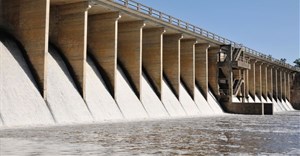Acid rain and contaminated water continue to negatively impact farming activities and communities in areas in which mines operate, despite claims by mining companies that they are complying with environmental standards and protocols, says the Bench Marks Foundation.
Carbon dioxide and sulphur dioxide emissions associated with platinum smelters, together with nitrogen oxide, give rise to acid rain. The rain is acidic and wreaks havoc on crops, plants, aquatic animals, as well as on infrastructure.
During its research into the corporate social responsibility and socially responsible investments of mines in South Africa, Bench Marks has come across many examples of damage seemingly caused by acid rain and contaminated water.
Crop yields decreased significantly
"We continue to receive reports from farmers, particularly in the North West Province, who claim that emissions from smelters and acid rain have harmed their crops and that their yield has decreased significantly since the increase in mining in the area," says John Capel, executive director for the Bench Marks Foundation. "In addition, citrus trees and other such crops have been damaged or have died due to the acid.
"Beside the environmental destruction, it can also have adverse effects on human health as the particles responsible for acid rain in the air contribute to heart and lung problems, including asthma and bronchitis. We have noted a steady increase in these ailments in areas in which high levels of mining occur.
Capel says that the elevated level of sulphides and nitrates often found in water near mines is a serious issue.
For farmers, too much sulphide in water can cause an increase in bacteria within the irrigation system. This forms masses of slime which clogs filters and emitters causing costly delays and repairs. And although nitrogen is used in farming, an excess of nitrates affects crops. It can also cause hypoxia which can become toxic to livestock.
Contaminated drinking water
"It poses a huge threat to those who drink the contaminated water, especially for infants, pregnant women, the elderly and those who are ill as a high concentration of nitrates results in the restriction of oxygen transport in the bloodstream. In newborn babies, it can lead to a disease called methemoglobinemia, which is often fatal."
Says Capel: "We urge the Departments of Environmental Affairs and Water Affairs to pursue corporations not adhering to legislation and regulations and to prosecute them. Tailings dams and rock waste facilities are often located too close to water sources, some mines are using water excessively causing the groundwater table to drop, particularly where open cast mining occurs.
"In addition, we call on these departments as well as the Department of Human Settlements to appraise itself of the appalling conditions in which mining communities are living in. Informal dwellings always shoot up around mines causing unsustainable pressure on resources. People are forced to drink contaminated water and sewage points burst and pour into rivers and streams, further contaminating our most precious resource."
















